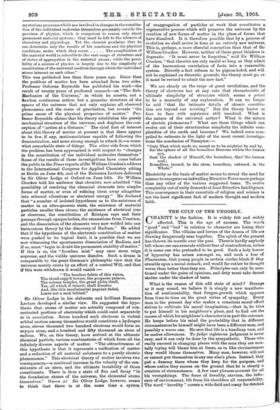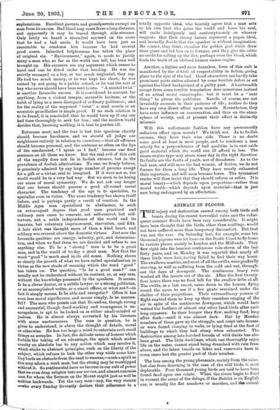C THE CULT OF THE UNGODLY. HAIL - ITY is the fashion.
It is widely felt and widely affected. Thie is the age of excuses. The words ,
"good" and "bad" in relation to character are losing their significance. The villains and heroes of the drama of life are drawing dangerously near together. The spirit of the present has thrown its mantle over the past. There is hardly anybody left whom one can execrate without fear of contradiction, unless it is some one who pretended to be good. Such a holy horror of hypocrisy has arisen amongst us, and such a fear of Pharisaism, that young people in certain circles blush if they stumble upon a moral remark, and would far rather be thought worse than better than they are. Principles can only be men- tioned under the guise of opinions, and duty must take decent shelter under the shadow of taste.
What is the reason of this odd state of mind P Strange as it may sound, we believe it is simply a new manifesta- tion of sentimentality, that fungus-growth which appears from time to time on the great virtue of sympathy. Every man in the present day who makes a conscious moral effort strives to cultivate his moral imagination,—that is, he tries to put himself in his neighbour's place, and to find out the causes of which his neighbour's character is in part the outcome. He keeps before his mind the probability that in different circumstances he himself might have been a different man, and possibly a worse one. He sees that life is a handicap race, and he makes allowances. To judge righteous judgment is never easy, and it can only be done by the sympathetic. Those who really succeed in changing places with the man they are men- tally trying will blame him at times, as in like circumstances they would blame themselves. Many men, however, will not or cannot put themselves in any one else's place. Instead, they put a dummy there whom they keep for the purpose, and whose antics they excuse on the ground. that he is clearly a creature of circumstance. A few cant phrases account for all his wrongdoings. The force of heredity, atavism, the Win- ence of' environment, lift from his shoulders all responsibility. The Word" heredity" covers a wide field and many far-fetched
etcplanationa. Excellent parents and grandparents exempt no man from its excuse. Bad blood may come from a long distance, and apparently it may be traced through side-streams. Only lately we heard a scoundrel excused on the score that he had a bad uncle. It would have been just as reasonable to condemn him because he had several good aunts. Inherited helplessness has taken the place of original sin. "Environment," again, is made to justify many a man who, so far as the world can tell, has been well brought up. His excusers use any argument which comes to hand and can be fitted under that heading. He was too strictly managed as a boy, or too much neglected, they say. He had too much money, or he was kept too short; he was ruined by not going to a public school, or he was the sort of boy who never should have been sent to one. "A mental twist" is another favourite excuse. It is considered to account for anything, from a violent temper, incurable laziness, or the habit of lying to a mere disregard of ordinary politeness; and for the reality of the supposed " twist " a mad cousin or an eccentric grandfather is ample proof. If no such relation is to be found, it is concluded that he would turn up if any one bad time thoroughly to seek for him; and the modern world decides that, knowing nothing, it is best to pardonall.
Extremes meet, and the fear is lest this spurious charity Should become harshness, and we should all judge our neighbours entirely in relation to ourselves,—t hat all offences should become personal, and the sentence so often on the lips of the uneducated, "I speak as I find," become our final• sentence on all those we know. But the real evil of this cult of the ungodly does not lie in foolish excuses, but in the prevalence of foolish admirations. No one, we firmly believe, is genuinely admired by any large number of persons except for a gift or a virtue, real or imagined. If it were not so, the world would be in a very bad way. But we seem to be losing our sense of moral symmetry. We do not ask any longer that our heroes should possess a good all-round moral Character. The tendency of the age is to specialise, to specialise even in virtue. The same tendency has shown itself before, and is perhS,ps partly a result of reaction. In the Middle Ages men specialised in abstinence, to such an extravagant degree that good men practised and ordinary men came to venerate, not self-control, but self- torture, not a noble independence of the world and its luxuries, but voluntary imprisonment, starvation, and filth. A hair shirt was thought more of than a kind heart, and celibacy was revered above the domestic virtues. Just now the favourite qualities are energy, industry, grit, and determina- tion, and when we find them we are dazzled and refuse to see anything else. To be a " strong " man is to be a great man, and in the world of to-day a good man. Not that the word " good " is much used in its old sense. Nothing shows so clearly the growth of what we have called specialisation in virtue as the new shade of meaning which the word " good " has taken on. The question, "Is he a good man P" can usually not be understood without its context, or, at any rate, without the knowledge possessed by the speakers. It means, Is he a clever doctor, or a subtle lawyer, or a strong politician, or an accomplished writer, or a smart officer, or what not P—in fact it simply means, Is he able and energetic P Often it has even less moral significance, and means simply, Is he success- ful ? The man who points out that So-and-so, though strong and successful, though hard-working and courageous, is un- scrupulous, is apt to be looked on as either small-minded or jealous. He is almost always corrected by his listeners with some unctuousness. The man in question, he is given to understand, is above the thought of details, moral or otherwise. He has too large a mind to entertain such small things as scruples. In fact, the delicate sense of honour which forbids the taking of an advantage, the spirit which makes cruelty an absolute bar to any action which may involve it, which sticks to abstract principles, such as the liberty of the subject, which refuses to look the other way.while some hire- ling hurls an obstacle from the road to success,—such a spirit as this may adorn a weak man, but the strong may be worshipped without it So sentimental have we become in our cult of power that we even drag religion into our service, and almosteanonise men for whom the Sermon on the Mount might just as well be written backwards. Yet the very men—nay, the very women a'idse every Sunday fervently declare their adherence to a totally opposite ideal, who heartily agree that a man ode to his own hurt who gains the world and loses his soul, will smile indulgently and contemptuously on whoever suggests that their strong heroes represent a pagan ideal, and inwardly decide that the speaker is without imagination. He cannot, they think, visualise the golden goal which drew their giant and led him on to fortune, and they give the critio no credit for calling up the dirt, perhaps even the blood, which fouls the track of an idolised human steam-engine.
Another, a lighter and more harmless, form of this cult is manifested by the dAticle of respectability in fiction, giving place to the epic of the bad. Good characters can hardly take prominent parts unless adorned by some terrible defect or set against the black background of a guilty past. A hairbreadth escape from some terrible temptation does sometimes instead of an actual moral catastrophe ; but it must be a "near thing" to please the publisher. Novels, of course, are not invariably accurate in their pictures of life ; neither do they have any very direct effect upon morals. Nevertheless, they have some influence on conversation, and thus on the atmo- sphere of society, and at present their effect is distinctly miasmic.
Will this unfortunate fashion have any permanently nefarious effect upon morals ? We think not. As to foolish excuses, they have their wise side. There is no doubt some good at least in most people, and to condemn a man utterly for a preponderance of bad qualities is to cast aside good material which the world can ill afford to lose. The steam-engine type may steam some day in the right direction- Its faults are the faults of youth, not of decadence. As to the bad man, and still more the bad woman, of fiction, we do not foresee for them a long life. They have nearly exhausted their repertoire, and will soon become bores. The tyrannical reader will then insist that they should reform or retire. It is moral beauty—which depends upon proportion—rather than moral worth—which depends upon material—that is just now being endangered by an affectation.











































 Previous page
Previous page